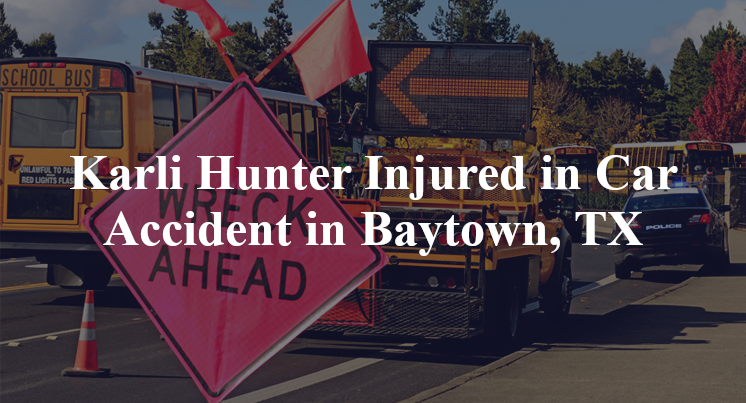Karli Hunter Injured in Car Accident in Baytown, TX
Harris County, TX — December 21, 2024, Karli Hunter was injured following a car accident at approximately 1:50 a.m. along Interstate Highway 10 (East Freeway).
According to authorities, a 32-year-old man and 26-year-old Karli Hunter were traveling in an eastbound Mazda on I.H. 10 in the vicinity of Sjolander Road when the accident took place.

Officials indicate that, for as yet unknown reasons, an eastbound Toyota Tundra changed lanes at an apparently unsafe time in a failed attempt to pass another vehicle on the left. This resulted in a collision between the front-end of the pickup truck and the front-right quarter of the Mazda.
Hunter—who was a passenger—suffered reportedly serious injuries over the course of the accident. The man who was with her in the Mazda possibly sustained injuries, as well, according to reports. Additional details pertaining to this incident are not available at this point in time. The investigation is currently ongoing.
Commentary
When a vehicle is struck during an unsafe lane change and someone inside suffers serious injuries, many assume the incident boils down to a moment of poor judgment. But in my experience, especially with early-morning crashes like this one on I-10 near Sjolander Road, a closer look is often needed to determine how and why that decision was made—and whether other factors contributed. To get those answers, there are three critical questions that should be asked.
First, did the authorities conduct a thorough investigation? Unsafe lane changes happen in a matter of seconds, but understanding them takes far more time. Investigators should have examined whether the vehicles were traveling at consistent speeds, whether the Toyota Tundra used a signal, and if the Mazda had room to maneuver or respond. Did the pickup actually attempt to pass two vehicles simultaneously? Was another vehicle ahead the source of the miscalculation? These kinds of details are essential to recreating what happened, and if not fully explored, may warrant an independent reconstruction.
Second, has anyone looked into whether a vehicle defect contributed to the crash? If the Toyota Tundra made a sudden or poorly timed lane change, it's fair to ask whether a mechanical or electronic malfunction influenced that action. Did the driver experience a problem with the lane assist system, steering, or brakes? Likewise, did the Mazda’s safety systems respond as they should have during the collision? A thorough forensic inspection of both vehicles is necessary to explore these possibilities, and that’s only possible if they are preserved in their post-crash condition.
Lastly, has all of the electronic data from both vehicles been retrieved? Both the Mazda and the Toyota Tundra likely have event data recorders that capture information like speed, throttle position, brake use, and steering input in the moments leading up to the collision. That data can clarify not only what each driver did, but how the vehicles responded. Additional context—such as dashcam footage, nearby surveillance video, or phone data—may also help establish the timeline. As always, this kind of evidence is time-sensitive and needs to be secured promptly.
When someone suffers serious injuries in a crash and the facts are still under investigation, assumptions aren’t enough. Asking these questions is the least that can be done to ensure that those affected by this crash get the clarity and closure they deserve.

*We appreciate your feedback and welcome anyone to comment on our blog entries, however all visitor blog comments must be approved by the site moderator prior to showing live on the site. By submitting a blog comment you acknowledge that your post may appear live on the site for any visitors to see, pending moderator approval. The operators of this site are not responsible for the accuracy or content of the comments made by site visitors. By submitting a comment, blog post, or email to this site you acknowledge that you may receive a response with regard to your questions or concerns. If you contact Grossman Law Offices using this online form, your message will not create an attorney-client relationship and will not necessarily be treated as privileged or confidential! You should not send sensitive or confidential information via the Internet. Since the Internet is not necessarily a secure environment, it is not possible to ensure that your message sent via the Internet might be kept secure and confidential. When you fill out a contact or comment form, send us an email directly, initiate a chat session or call us, you acknowledge we may use your contact information to communicate with you in the future for marketing purposes, but such marketing will always be done in an ethical way.